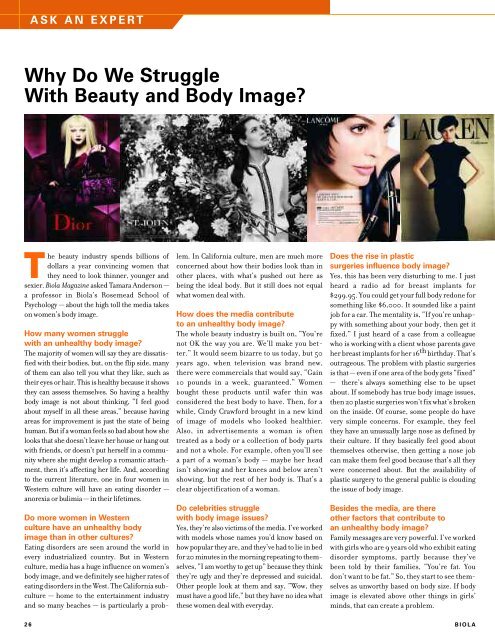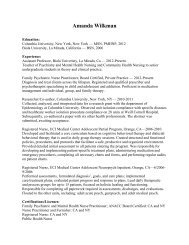New President, New Century New President, New ... - Biola University
New President, New Century New President, New ... - Biola University
New President, New Century New President, New ... - Biola University
Create successful ePaper yourself
Turn your PDF publications into a flip-book with our unique Google optimized e-Paper software.
26<br />
ASK AN EXPERT<br />
Why Do We Struggle<br />
With Beauty and Body Image?<br />
The beauty industry spends billions of<br />
dollars a year convincing women that<br />
they need to look thinner, younger and<br />
sexier. <strong>Biola</strong> Magazine asked Tamara Anderson —<br />
a professor in <strong>Biola</strong>’s Rosemead School of<br />
Psychology — about the high toll the media takes<br />
on women’s body image.<br />
How many women struggle<br />
with an unhealthy body image?<br />
The majority of women will say they are dissatisfied<br />
with their bodies, but, on the flip side, many<br />
of them can also tell you what they like, such as<br />
their eyes or hair. This is healthy because it shows<br />
they can assess themselves. So having a healthy<br />
body image is not about thinking, “I feel good<br />
about myself in all these areas,” because having<br />
areas for improvement is just the state of being<br />
human. But if a woman feels so bad about how she<br />
looks that she doesn’t leave her house or hang out<br />
with friends, or doesn’t put herself in a community<br />
where she might develop a romantic attachment,<br />
then it’s affecting her life. And, according<br />
to the current literature, one in four women in<br />
Western culture will have an eating disorder —<br />
anorexia or bulimia — in their lifetimes.<br />
Do more women in Western<br />
culture have an unhealthy body<br />
image than in other cultures?<br />
Eating disorders are seen around the world in<br />
every industrialized country. But in Western<br />
culture, media has a huge influence on women’s<br />
body image, and we definitely see higher rates of<br />
eating disorders in the West. The California subculture<br />
— home to the entertainment industry<br />
and so many beaches — is particularly a prob-<br />
lem. In California culture, men are much more<br />
concerned about how their bodies look than in<br />
other places, with what’s pushed out here as<br />
being the ideal body. But it still does not equal<br />
what women deal with.<br />
How does the media contribute<br />
to an unhealthy body image?<br />
The whole beauty industry is built on, “You’re<br />
not OK the way you are. We’ll make you better.”<br />
It would seem bizarre to us today, but 50<br />
years ago, when television was brand new,<br />
there were commercials that would say, “Gain<br />
10 pounds in a week, guaranteed.” Women<br />
bought these products until wafer thin was<br />
considered the best body to have. Then, for a<br />
while, Cindy Crawford brought in a new kind<br />
of image of models who looked healthier.<br />
Also, in advertisements a woman is often<br />
treated as a body or a collection of body parts<br />
and not a whole. For example, often you’ll see<br />
a part of a woman’s body — maybe her head<br />
isn’t showing and her knees and below aren’t<br />
showing, but the rest of her body is. That’s a<br />
clear objectification of a woman.<br />
Do celebrities struggle<br />
with body image issues?<br />
Yes, they’re also victims of the media. I’ve worked<br />
with models whose names you’d know based on<br />
how popular they are, and they’ve had to lie in bed<br />
for 20 minutes in the morning repeating to themselves,<br />
“I am worthy to get up” because they think<br />
they’re ugly and they’re depressed and suicidal.<br />
Other people look at them and say, “Wow, they<br />
must have a good life,” but they have no idea what<br />
these women deal with everyday.<br />
Does the rise in plastic<br />
surgeries influence body image?<br />
Yes, this has been very disturbing to me. I just<br />
heard a radio ad for breast implants for<br />
$299.95. You could get your full body redone for<br />
something like $6,000. It sounded like a paint<br />
job for a car. The mentality is, “If you’re unhappy<br />
with something about your body, then get it<br />
fixed.” I just heard of a case from a colleague<br />
who is working with a client whose parents gave<br />
her breast implants for her 16 th birthday. That’s<br />
outrageous. The problem with plastic surgeries<br />
is that — even if one area of the body gets “fixed”<br />
— there’s always something else to be upset<br />
about. If somebody has true body image issues,<br />
then 20 plastic surgeries won’t fix what’s broken<br />
on the inside. Of course, some people do have<br />
very simple concerns. For example, they feel<br />
they have an unusually large nose as defined by<br />
their culture. If they basically feel good about<br />
themselves otherwise, then getting a nose job<br />
can make them feel good because that’s all they<br />
were concerned about. But the availability of<br />
plastic surgery to the general public is clouding<br />
the issue of body image.<br />
Besides the media, are there<br />
other factors that contribute to<br />
an unhealthy body image?<br />
Family messages are very powerful. I’ve worked<br />
with girls who are 9 years old who exhibit eating<br />
disorder symptoms, partly because they’ve<br />
been told by their families, “You’re fat. You<br />
don’t want to be fat.” So, they start to see themselves<br />
as unworthy based on body size. If body<br />
image is elevated above other things in girls’<br />
minds, that can create a problem.<br />
BIOLA

















